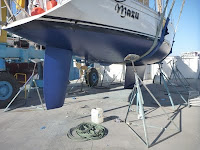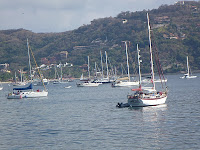














We are finally on our way into the Sea of Cortez. We have spent the last 6 weeks in Marina's, Haul-Out and crossing over from the mainland of Mexico. Now it is time to relax and explore the Sea.
We leave La Paz on morning of May 5th, after a farewell dinner, dancing and Margaritas. Our first anchorage is in Partida Bay on Espiritu Santo/Isla Partida Island(s). We have anchored here before, last November. A truly lovely night. I make coleslaw and grill steaks.
We do not stay but one night on Espiritu Santo as we want to get north to explore areas we have not been to. But we cannot resist though another stop on Isla San Francisco, one of our favorites from last fall. Here we find a fantastic shell beach and collect a bag full to go with my collection from La Paz.
In
Bahia Salinas on Isla San Jose, once the location of a salt mine, it is now abandoned. We explore the "ghost town" of old trucks, equipment, and small buildings. We then anchor in San Evaristo on the main land side (Baja). There is a small fishing village here, we stay just one night.
We stop in Puerto los Gatos where we are celebrating Mothers day. It is very pretty here with beautiful red rock bluffs and the dramatic backdrop of the Sierra de la Giganta. But the bees are very bad here, chasing us out of the cockpit and into the boat. We leave the next morning.
Aqua Verde This bay ranks as one of my favorites. This bay has good wind and wave protection, beautiful views, aqua colored water, good snorkeling, and a small village complete with a school 2 small tiendas and a resturant (well kind of). It is a popular spot with cruisers and there are several boats here, but it does not feel crowded. We are greeted by our friends, Mark and Emily from Groovy. We last saw them in San Blas. That evening, in our cockpit we enjoy drinks and snacks and catch up on our various adventures.
The next day we take our dingy to shore to explore the "town" and go to the tienda. There are about a dozen homes, a school and soccer field (dirt and with free range goats grazing the sidelines), some sort of official building, 2-5 dirt roads, and 2 small tiendas. The red building is the "SuperMini" tienda. It is a small concrete building with old chest freezers in the yard outside. It is surprisingly well stocked. No shelves but various products in boxes line the walls with bread, T.P. some veggies, box milk etc. Outside in the old chest freezers, (not freezing) are bags of other various veggis. I was able to buy all the veggies I needed. We also run into old frinds David & Donna from the boat Salona.We have not seen them since Tenacatita, on the Mexican mainland.
We spend several days here snorkeling, beachcombing,and swimming. We saddly raise anchor and head to Puerto Escondido to get fuel and water (oh, did I mention our watermaker is not working, but that is another story), and to go to the town of Loreto.
Puerto Escondido/Loretto:Puerto Escondido is one of Baja's most protected harbors with lots of room for many boats and can easily hold over 150 boats. You can either anchor, hook onto a mooring ball, or tie up to the dock at the small marina here.
From here we are able to rent a car for the trip to Loretto where we plan on spending the night. Loreto is a very historic town. It is here in 1697 that Jesuit padre Juan Maria Salvatierra landed to establish a settlement and the first mission of the Californias. Loreto then became the center for the church and government becoming the first capital of Baja. This mission became the center for establishing other missions in Baja and California. Loreto is where Franciscan padres Portola, and Serra left in 1769 to travel north to San Diego and eventually to discover San Francisco Bay. The mission is open to the public and we visit it and the museum next door. It is beautiful. We spend the night in the beautiful Hotel Posada de las Flores.
Loreto is a active oceanside town. There is an international airport (small, arrivals and departures 2-3 times per week) here so along with the localMexicans there is a large group of gringos who call Loreto home, at least for the winter.
We return to Puerto Escandido and take on fule and water and contiue north. Anchoring in: Honeymoon Cove, Bahia Salinas (another one), Carmen Island, Isla Coronados, and Punta Mangles as we contiue north. Along the way I have been reading John Stienbecks, "The Log of the Sea of Cortez". It chronicles all of these areas, it is fun and interesting to read his descriptions of the places I am seeing over 50 years later.
Caleta San Juanico : Another one of my favorites. A large bay with several "lobes". Here there are fantastic reefs, pinnacle rock formations, a small sea cave to explore,varied colored cliffs, birds (we see several Osprey and their nests), clear water and white sandy beaches. We spend several days here where we snorkel, and fish along the reefs (I catch a 4lb. Trigger fish, good eating). The weather is getting warmer but there is a nice breeze to keep you cool and of course you can always cool off with a jump in "the pool".
Continuing north we reach Bahia Concepcion on Thursday May 25th. We have some problems going on with our Chart plotter, luckly we have back-up navigation but it is still a big pain as it beeps a lot and goes off a lot. There seems to be always something to fix on a boat.
Bahia Concepcion: Our guide book says, "RVers, campers, kayakers, fishermen and vacationers from around the world all come to Bahia Concepcion to sample its beautiful bays, and beaches." I can see why, it
is beautiful. This large bay is nearly 25 miles in length and protected by a peninsula of land on the east. There are a number of good anchorages and we stay in Playa Santispac, (one night), and El Burro cove. Here we get to see and swim (I swam with Mel watched) with the magnificent whale sharks. As the name implies,these sharks are very large but these gentle sharks are harmles. They lazily swim around with their massive sized mouths open and gobble up the krill in the bay. We are lucky to seem them each day we are there.
We also take a short hike to see the Amerindian petroglyphs in the rocky Mnts. near El Burro Cove.
Along El Burro Cove are rustic playpa style houses, while Hwy 1 meanders through Bahia Concepion these places are off the grid, using solar and generators for power. There is even a resturant and bar is this small community. A beach front playpa can be bought for about 30,000.00 USD, you are leasing the land for about 200.00 USD per month.
Next we will head to Santa Rosalia, the furthest north we plan to go. There is a town and marina there. It is time to restock the fridge.
Pictures in this Blog:*The abandoned mine building Salinas
*Mel surveys the equipment left on Salinas (hmm... can I make a race car from this?)
*The school yard at Aqua Verde (note the free range goats)
*A boat at anchor in Aqua Verde
*looking through a window of the abandoned mine buildings Salinas
*Courtyard of our hotel, Loreto
*Mision Nuestra Senora de Loreto (Mission of our Lady of Loreto)
*Bahina Salinas (#2)
*Whale Shark, El Burro Cove
*Pinacle Rock @ San Juanico
*Trigger fish, San Juanico
*Example of one of the petroglyphs near El Burro Cove (Bahia Concepcion)
*Mel overlooking El Burro Cove
*Elaine resting
*Mazu anchored at El Burro Cove





















































